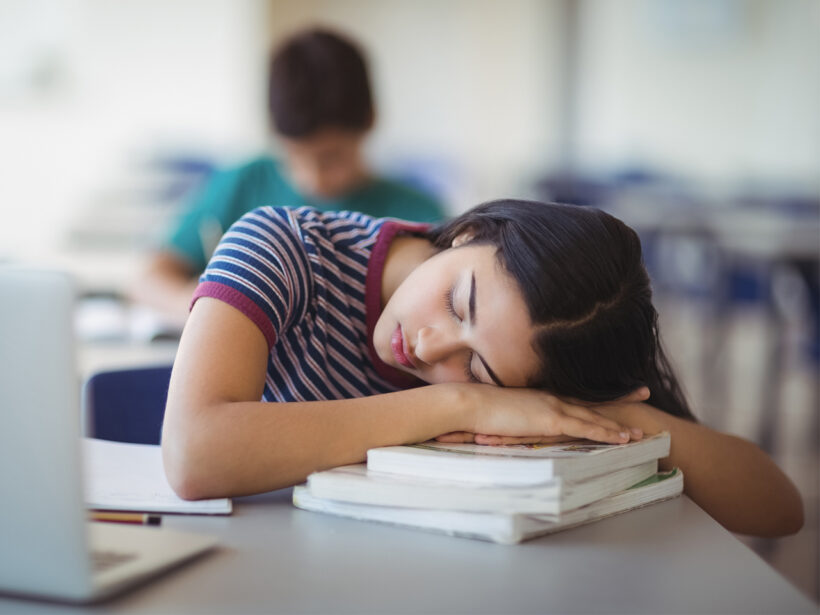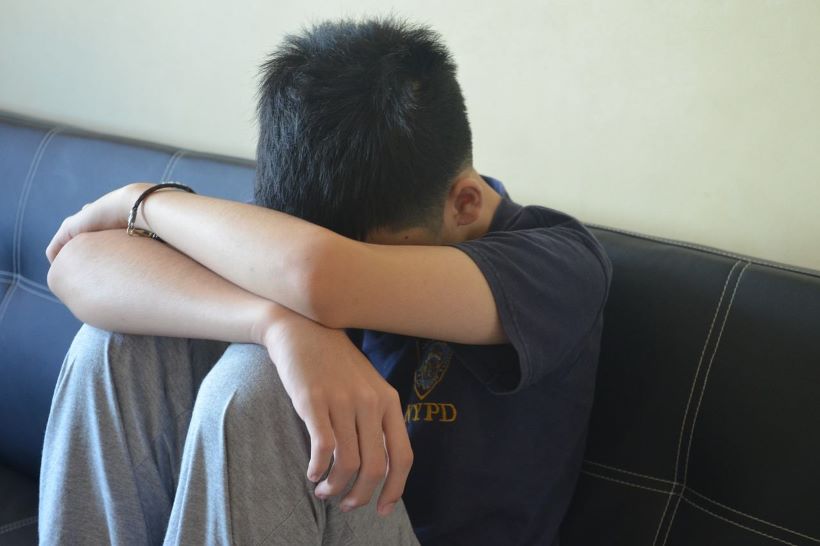I am a mom to 2 teens and sleep has always been an issue.
When they were babies I always complained they didn’t sleep enough and would be up at the crack of dawn when I wanted to just lie in bed and then as they hit 12 years, waking them up became a chore.
But the last 2 years have changed things – a combination of anxiety, heavy technology use and spending a lot of time in their bedrooms led to less sleep for many teens.
It has been observed that by age 15, most kids go to bed later than their parents and share a pillow with their phones. Many parents of teenagers have no idea what time their child goes to bed or how much they actually sleep. The only reason I do have an idea about my kids’ sleep patterns is because, I take their phones away at night after a particular time. But I know their friends are online talking or playing well past 1 AM on most days.
Now we all know that sleep is vital for people of any age. But teens are in a developmental phase and need sleep more than they know. A healthy night’s sleep gives us resources to cope with our daily tasks. It is especially relevant for teenagers who are still growing and developing.
An MIT study has shown that grades of students with an average sleep time of about seven and a half hours were up 50 % compared to students who slept an hour less. This means that they can significantly increase their academic performance if they control the quality and duration of their night’s sleep.
A study published in The Journal of Child Psychology and Psychiatry shows what happens to the brains of teenagers if they become “night owls”. Teenagers who sleep very late in the night are at increased risk of having behavioural problems and delayed brain development later in life.
Regularly not getting enough sleep leads to

- Chronic sleep deprivation
- Concentration difficulties
- ‘Drifting off’ in class
- Shortened attention span
- Memory problems
- Increased risk of depression
- Anxiety
- Low self-esteem
- Affect academic performance at school
Both the National Sleep Foundation and the American Academy of Sleep Medicine agree that teens need between 8 and 10 hours of sleep per night. This is more than the amount a child or an adult needs. Yet most adolescents only get about 6.5 – 7.5 hours sleep per night, and some get less.
I was reading an article on the same topic in the Wall Street Journal and as per them
Part of the reason for this night owl tendency is a natural delay in the body’s sleep clock. During adolescence, our circadian rhythms—governed by a collection of neurons in the brain called the suprachiasmatic nuclei (SCN), or the “master clock”—undergo a timing shift. Teens are biologically programmed to go to bed later and wake up later than younger children and adults.
Did you know that your teens’ puberty hormones and circadian rhythm actually play a role in their changing sleeping habits?
What Are Some Of The Causes Of Sleep Deprivation In Teens?

- Hormonal time shift – Once they hit puberty their circadian rhythm changes pushing the teenager’s body clock forward by about one or two hours, making them sleepier one to two hours later. Yet, while the teenager falls asleep later, early school starts don’t allow them to sleep in. This nightly ‘sleep debt’ leads to chronic sleep deprivation.
- Using screen-based devices – Using devices keeps a teen’s brain wired, and incoming notifications can cause disrupted sleep. Evidence also points to low melatonin production from exposure to the light from cell phones.
- Sleep disorders – such as restless legs syndrome or sleep apnea, can affect how much sleep a teenager gets.
How Can You Help Teens Sleep Better?

- Budget eight hours of sleep into the daily schedule and keep that same schedule on both weekdays and weekends.
- Assess your teenager’s weekly schedule together and see if they are overcommitted. Help them to trim activities if they are.
- Creating a consistent pre-bed routine
- Avoid caffeine and energy drinks, especially in the afternoon and evening.
- Putting away electronic devices for at least a half-hour before bed and keeping them on silent mode to avoid checking them during the night.
- Make sure the bed, pillow and linen are clean and comfortable.
- Keep your bedroom cool, dark, and quiet.
Ms Turgeon and Ms Wright are psychotherapists and sleep specialists and they have mentioned in their book “Generation Sleepless: Why Tweens and Teens Aren’t Sleeping Enough and How We Can Help Them,”
The cells in our eyes that set the circadian rhythms respond best to the sun, so morning sunlight is particularly effective, starting a timer in the brain that sets the stage for the sleep that will come 15 or so hours later. A good rule of thumb for teens is to go outside for breakfast and walk to school if possible; on weekends, they should go for a walk or run when they first wake up. After morning has passed, the circadian rhythms have moved on and light will no longer advance the clock.
We recommend that you check in with your teen and ask (not nag, but ask), “what can I do to help keep you on track? They need to be consistent and parents need to model good sleep habits for their teens. Parents who make sleep a priority for themselves show their kids that it’s part of living a healthy lifestyle—like eating right and exercising regularly.
Are you on track to change your sleep pattern and your teens?


















